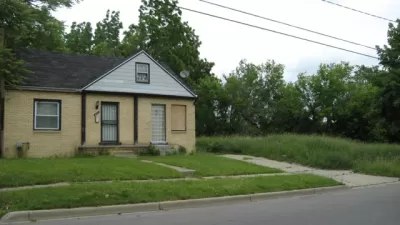Exclusives
BLOG POST
'We Pay Taxes; Parks Don’t'
Some argue that if something is not directly contributing to our public coffers, why protect it? Perhaps it’s worth broadening our understanding of the services – and tax implications – provided by parks.

FEATURE
Planning Chicago: An Interview with D. Bradford Hunt and Jon B. DeVries
After decades of decline, Chicago is reveling in its resurgence as America’s hottest urban center and a “port of the global age.” However, these successes conceal a city struggling with increasing inequality and a planning culture “in retreat.”

FEATURE
The Case for Age-Friendly Suburbs
Several trends are conspiring to challenge America's ability to house and care for its senior citizens. Utilizing successful examples, architect and planner Eric C.Y. Fang examines how the suburbs can be adapted to support an aging population.
BLOG POST
The "Vertical Sprawl" Myth
Opponents of high- and mid-rise development often use the term "vertical sprawl." But in fact there is little similarity between high-rise infill and suburban sprawl: the major arguments against one do not apply to the other.
BLOG POST
An Easier Way To Fight Sprawl
Instead of always fighting to make sprawl development harder, let's focus our energy on making great infill development easier.
BLOG POST
Density Done Well, and Not Just Downtown
It’s an understatement to say that the “D-Word” is a controversial subject in cities across North America. It needn’t be so though, and shouldn't be, as when it’s done well, density is immensely important to the success of cities and regions.
BLOG POST
The Power of Place: On Democracy and Public Participation in Planning
More thoughts on how public participation in the placemaking process can create better places and better functioning democracies.

FEATURE
Top Trends 2012-2013
Over the course of the year, the editors of Planetizen review and summarize thousands of articles, books, studies and editorials related to planning and urban development. Here are our picks for the most notable planning trends of the past year.
BLOG POST
Critiquing the "Urban Mobility Report"
The "Urban Mobility Report" produces widely-cited congestion cost estimates. It is biased in various ways that exaggerate congestion costs and roadway expansion benefits. Few users of these cost estimates seem aware of these problems.

BLOG POST
Writing a Statement of Purpose for Graduate Education
How should a statement of purpose for a graduate school application differ from one for an undergrad program? This post outlines the elements of a compelling graduate school statement.

FEATURE
A Plan To Shrink Detroit (Well)
Justin Hollander, PhD, AICP, looks closely at Detroit’s new Strategic Framework Plan and finds a compelling plan to manage depopulation. The plan takes a realistic view of what it would take to make Detroit a great city without growing.
BLOG POST
The case against mixed-use: not proven
A recent study suggesting that mixed-use zoning increases crime is not as persuasive as it might seem at first glance.
BLOG POST
The Most Important Urban Design Decision Vancouver Ever Made
Vancouver's ahead-of-the-curve 1997 decision to prioritize active transport, rather than balance its ways of getting around, has affected everything about how the city has been designed since then.
BLOG POST
Affordability As A Transportation Planning Objective
Transportation system users rate inaffordability as a top concern, but conventional planning ignores this issue. Increasing transport affordability requires changing planning practices to favor more affordable modes and more accessible development.
BLOG POST
Parks, in Need of a New Metaphor
Parks have long been likened to "the lungs of the city." But to better capture the totality of parks' role in our urban milieu a more apt metaphor is necessary.
BLOG POST
Form-Based Codes Lite
There may be a way to supply some of the benefits of form-based codes without heavy-handed aesthetic regulation. In theory, a form-based code could be limited to verifiable characteristics such as setbacks, yard types, building height, frontage size and lot coverage.
BLOG POST
The Conundrum of local food and/vs. sustainability
Most plants grown for food require significant amounts of water - water that Los Angeles doesn't have. How does one identify the point at which local isn't sustainable?

BLOG POST
Making the Most of Being a Student, Part 2
Making the most of being a student requires more than just completing the course credits necessary for a degree. See my suggestions for activities beyond the classroom that are key to getting a great education.
Pagination
Heyer Gruel & Associates PA
JM Goldson LLC
Custer County Colorado
City of Camden Redevelopment Agency
City of Astoria
Transportation Research & Education Center (TREC) at Portland State University
Jefferson Parish Government
Camden Redevelopment Agency
City of Claremont
Urban Design for Planners 1: Software Tools
This six-course series explores essential urban design concepts using open source software and equips planners with the tools they need to participate fully in the urban design process.
Planning for Universal Design
Learn the tools for implementing Universal Design in planning regulations.


































